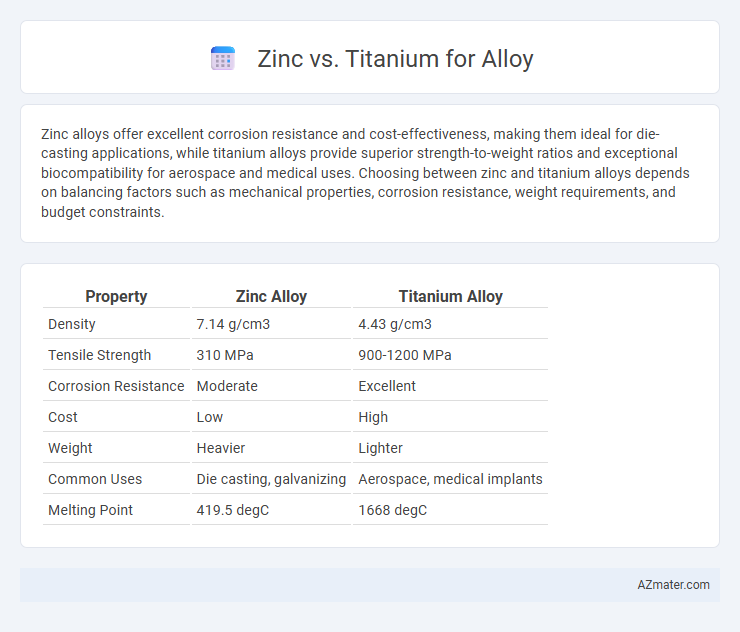Zinc alloys offer excellent corrosion resistance and cost-effectiveness, making them ideal for die-casting applications, while titanium alloys provide superior strength-to-weight ratios and exceptional biocompatibility for aerospace and medical uses. Choosing between zinc and titanium alloys depends on balancing factors such as mechanical properties, corrosion resistance, weight requirements, and budget constraints.
Table of Comparison
| Property | Zinc Alloy | Titanium Alloy |
|---|---|---|
| Density | 7.14 g/cm3 | 4.43 g/cm3 |
| Tensile Strength | 310 MPa | 900-1200 MPa |
| Corrosion Resistance | Moderate | Excellent |
| Cost | Low | High |
| Weight | Heavier | Lighter |
| Common Uses | Die casting, galvanizing | Aerospace, medical implants |
| Melting Point | 419.5 degC | 1668 degC |
Introduction to Zinc and Titanium Alloys
Zinc alloys are prized for their excellent castability, corrosion resistance, and cost-effectiveness, making them ideal for die-casting applications in automotive and consumer electronics. Titanium alloys offer superior strength-to-weight ratios, exceptional corrosion resistance, and biocompatibility, driving their use in aerospace, medical implants, and high-performance sporting goods. Both metals serve critical roles in alloy formulations, with zinc favoring mass production and titanium excelling in high-strength, lightweight applications.
Chemical and Physical Properties Comparison
Zinc and titanium alloys exhibit distinct chemical and physical properties that influence their applications; zinc alloys feature a lower melting point around 420degC and excellent corrosion resistance in atmospheric conditions, while titanium alloys have a high melting point near 1668degC and exceptional strength-to-weight ratio with outstanding corrosion resistance in marine and acidic environments. Chemically, zinc is more reactive and prone to oxidation, whereas titanium forms a stable oxide layer that protects it from further degradation. Physically, titanium alloys are significantly lighter and stronger than zinc alloys, making them ideal for aerospace and biomedical fields where durability and weight reduction are critical.
Strength and Durability Differences
Titanium alloys exhibit superior strength-to-weight ratios and exceptional corrosion resistance compared to zinc alloys, making them ideal for high-performance applications. Zinc alloys, while less strong, offer good castability and moderate durability, suitable for cost-effective, non-structural components. The durability of titanium alloys outperforms zinc by maintaining integrity under extreme conditions, withstanding fatigue, and resisting wear significantly better over time.
Corrosion Resistance: Zinc vs Titanium
Titanium exhibits superior corrosion resistance compared to zinc due to its ability to form a stable oxide layer that protects it from aggressive environments, including seawater and acidic conditions. Zinc, while offering sacrificial protection by corroding preferentially to steel, tends to degrade faster in highly acidic or alkaline environments. Alloy compositions leveraging titanium provide enhanced durability and longevity in harsh conditions, making them ideal for applications requiring minimal corrosion maintenance.
Weight and Density Considerations
Zinc alloys typically have a density around 6.7 g/cm3, making them heavier than titanium alloys, which range from 4.43 to 4.51 g/cm3. Titanium's lower density results in a significantly lighter material, ideal for applications demanding strength-to-weight efficiency. Weight-sensitive industries such as aerospace and automotive benefit from titanium alloys due to their superior strength-to-weight ratio compared to zinc alloys.
Thermal and Electrical Conductivity
Zinc alloys typically exhibit moderate thermal conductivity around 116 W/m*K and electrical conductivity approximately 28% IACS, making them suitable for applications requiring efficient heat dissipation and moderate electrical performance. Titanium alloys, with significantly lower thermal conductivity near 21.9 W/m*K and electrical conductivity roughly 1.2% IACS, provide superior corrosion resistance and mechanical strength but limit conductive efficiency in thermal and electrical roles. Selecting between zinc and titanium alloys depends on balancing the need for high conductivity in thermal management and electrical applications against mechanical durability and corrosion resistance.
Common Industrial Applications
Zinc alloys are widely used in die-casting for automotive parts, electrical components, and hardware due to their excellent corrosion resistance and cost-effectiveness. Titanium alloys find common industrial applications in aerospace, medical implants, and chemical processing equipment because of their high strength-to-weight ratio, biocompatibility, and superior corrosion resistance. Both metals serve specialized sectors where performance requirements dictate the choice between zinc's affordability and titanium's durability.
Cost Analysis and Availability
Zinc alloys generally offer a lower cost option compared to titanium alloys due to zinc's abundance and easier extraction process, making zinc ideal for budget-sensitive projects. Titanium alloys, while more expensive, provide superior strength-to-weight ratios and corrosion resistance, but their higher production costs stem from complex refining and limited global supply. Availability of zinc is greater worldwide, ensuring consistent supply chains, whereas titanium's more restricted mining locations can lead to fluctuating prices and limited availability in some markets.
Environmental and Health Impacts
Zinc alloys exhibit moderate environmental impact due to their recyclability and lower energy consumption during production compared to titanium, which requires high energy input for extraction and processing. Prolonged exposure to zinc dust or fumes can cause respiratory issues, while titanium is generally considered biocompatible with minimal toxicity, making it safer for health in medical and consumer applications. Both metals require careful management to minimize environmental contamination, but titanium's inert nature often results in less ecological toxicity over its lifecycle.
Choosing the Right Alloy: Zinc or Titanium
Zinc alloys offer excellent corrosion resistance and are cost-effective, making them ideal for die-casting applications requiring moderate strength and good electrical conductivity. Titanium alloys provide superior strength-to-weight ratio, exceptional corrosion resistance, and biocompatibility, suitable for aerospace, medical, and high-performance engineering uses. Selecting between zinc and titanium depends on application-specific factors like mechanical strength, weight considerations, environmental exposure, and budget constraints.

Infographic: Zinc vs Titanium for Alloy
 azmater.com
azmater.com